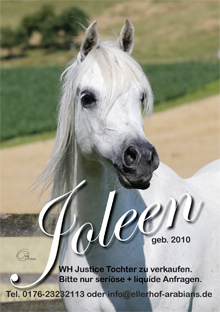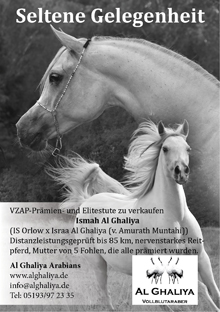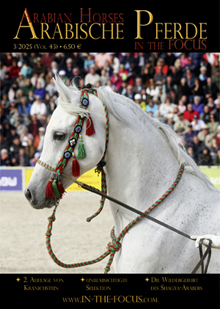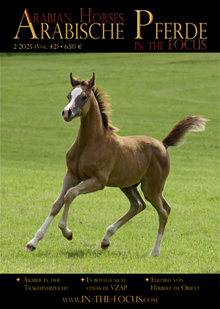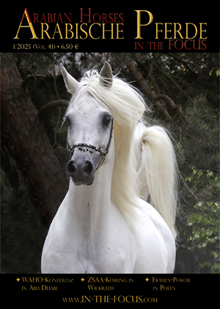Foundation of the Heritage Arabian Racing Club (HARC)
Many Arabian horse breeders and officials are sharing concerns over the looks, abilities and purity of the Arabian (race) horse and put a big question mark to the modern Arabian race horses of French and Saudi bloodlines which have swamped the game and changed the nature of Arabian racing. For this reason, representatives of 10 different countries have founded th e “Heritage Arabian Racing Club (HARC)”, initiated by HH Sheikh Sultan Bin Zayed Al Nahyan. We have asked HARC about the goals and planned activities of this new organisation.
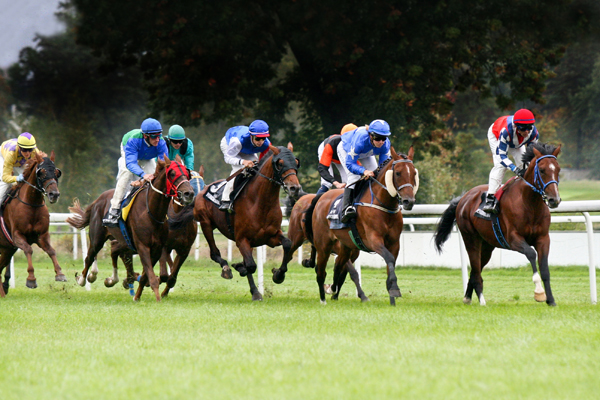
Arabian Horses IN THE FOCUS: In a lot of countries, amateur owners have left Arabian racing, as they feel they don’t have a chance to win anymore. Can you describe the problem that Arabian racing is facing today?
Deirdre Hyde, member of the HARC Steering Committee: First of all I think that Arabian racing has almost been a victim of its own success. Its rise in popularity changed it from a sport for those who loved the Arabian horse first and racing second or as in Poland and Russia etc. where it was used it as part of an overall selection process, to the Sport of Sheikhs who, not unreasonably, see it as part of their own heritage and invested in it heavily. As big money stepped in from the Middle East so Arabian racing was transformed, the best horses, even whole herds, changed hands for huge sums of money; winning and greater speed became all important. Many of the fiercely competitive newcomers, whether in racing or in shows, seem to care only about the winner’s circle, and have had little interest in the breed as a whole. Then came the economic crisis, Europe and USA were hit particularly hard, and owning and training racehorses an expensive luxury that had to be sacrificed. Breeders stopped producing horses for pleasure which left the way open for commercial breeders who were interested in the most successful and saleable bloodlines regardless of any questions of type and purity, to sell to people with the deepest pockets. In countries where this newly developing racing market was taking off such as, Europe, UK and USA certain highly successful lines began to dominate and they chased away the opposition, then there were not enough horses to fill races so the race calendars were reduced and it became still harder to win races. Ironically just as the number of horses and owners declined, so prize money became higher than ever, but it landed in very few purses. What seemed to happen was that the all-round Arab horse owners, once the backbone of the sport were squeezed out, there were no appropriate races, and little or no market for their horses, finally much of the racing business was taken over by people from other racing worlds and Arabian racing took on a character disconnected with the traditional type of purebred Arab horse. Of course this had benefits it brought much greater professionalism into the sport and International recognition and the opportunity of racing on some of the most famous tracks in the world, but it also lost something special for the breed. In other parts of the world, countries such as Turkey, Tunisia, Egypt, Iran that have bred and raced their own lines of Arabians for a century or more, already see or experience the danger of being swamped by these imported faster horses which then kill off the local market. This is now happening in Poland and Russia, and countries new to racing such as Brazil and Australia who see racing as a potential market place for their home produced horses are concerned that the “need to win” will bring to their shores imported bloodlines which will finish off the very market for which racing was started. For others it seems the breed has splintered into specialised racehorses and exotic show horses leaving those in the middle without a place. Racing was once a possibility but with nothing being done to support or respect these horses, the owners leave not just racing but also the Arab breed.
Arabian Horses IN THE FOCUS: There seem to be two “schools of thought” when it comes to Arabian racing. The one says: “The fastest horse is the best, regardless of its appearance”, the second says: “the best horse is the one that combines Arabian characteristics with good performance, but it doesn’t need to be the fastest”. What is your opinion about these two ways of looking at racing and the breeding of Arabian race horses?
Deirdre Hyde: Realistically, I believe there should be room for both schools of thought, or more precisely, it is natural to want to have a chance of winning even if the race is only part of an overall test. People do not mind if they have an out and out beauty who can scrape home a 4th or 5th, but for those horses who are less than top class in the beauty stakes but are sound, correct Arabians they deserve a chance at success. There are few breeders who can afford or wish to breed and race their horses with little hope of hitting the board occasionally, even if racing is only a test of character and soundness or a springboard to endurance. It therefore seems obvious that the actual races need to be put onto a level playing field; there must be the chance to race like with like. Take motor racing; Formula one cars (of which there are also several grades, each race separately) do not race against rally cars or stock cars but no one says because a particular type of car is not a Formula One nor does it look like Formula One it is too slow to race, each type is appreciated for what it is and various types of race are organised to suit to fit demand. Thoroughbreds by their sheer numbers have races where you can race your moderate horse against other moderate horses, your Point to Pointer is unlikely ever to race against high grade steeplechasers and so on, and there is no scorn in this. I believe if there are the races for HARC horses with decent prize money people will breed for them and want to run horses in them. For most people the thrill of a win is still very special no matter what level. If the grass roots of a sport is healthy the top will always look after itself. So that is our aim, to encourage races for horses of a similar type and agreed origin, the basis of the breed.
Arabian Horses IN THE FOCUS: Everybody talks about the alleged impurity of certain horses. Who are these horses, which are “under suspicion”?
Deirdre Hyde: This is a particularly difficult and sensitive question; some years ago WAHO produced a booklet called ‘What is purity?’, this sheds light on the various questionable horses in many of our studbooks; purity seems to mean different things to different people at different times. In fact we do not really know which or if there is a truly purebred horse. WAHO has given its definition which must be accepted. In the end anyone who cares truly about the Arabian must do their own researches and reach their own conclusions. However over the centuries Arabians have been raced without changing their basic characteristics or their speed, it is only in recent years we have seen fairly dramatic changes and these appear to have come with horses about whom question marks have been raised. Nevertheless many researches were carried out by WAHO and their registering authorities, and no one has been able to come up with any concrete proof against such horses so we have to accept they are here to stay. Nevertheless for those that prefer the more original type of horse they are in danger of disappearing and need to be preserved if only for the general diversity of the breed. For the sake of HARC, the founding member countries wanted something simple as a definition, and we have taken a view on a number of horses about whom there has been recent controversy and whose descendants have shown unusually improved racing performance, and we decided this would be our starting point. no horses with these stallions in their pedigrees will be allowed to race in HARC races, maybe there will be others and we reserve the right to add to or change this list if necessary.
Arabian Horses IN THE FOCUS: Could the increasing amounts of money that was (and still is) poured into Arabian racing have furthered the danger of cheating with pedigrees?
Deirdre Hyde: That is also a difficult question, another double edged sword! Unfortunately greater money brings in greater danger of all cheating full stop, and winning by any form of cheating is bad for a breed in so many ways, but equally horses and racing are expensive luxuries so if good prize money makes the horses more valuable this is good for breeders, we would just like to see the jam spread around. I believe the ‘Sheikh Mansour Bin Zayed Al Nahyan, Wathba Stud Farm Cups’ for small owners have helped racing enormously. One would hope that these days with DNA testing and so on, it is much more difficult to cheat with pedigrees, and that WAHO is ever vigilant of its member registries with the strength to deal with any situations it considers doubtful. Nevertheless I fear we have not followed in Lady Anne Blunt’s steps too closely, would she have approved of the way things turned out? I doubt it, she was ruthless in discarding anything she felt the pedigree was not right. Then we hear of the unacknowledged clones in the show world, true or not, I do not know, but who can say it might not go on in racehorse breeding if money is what it takes. There will always be champions who run a little bit faster than their rivals, but HARC eligible horses still run to within a second or two of their ancestors. It would appear this type of horse reached its maximum ability some time ago.
Arabian Horses IN THE FOCUS: HARC intends to sponsor races for HARC-accepted horses. What is the definition of a HARC-accepted horse, and who decides which horses will be HARC-acceptable?
Deirdre Hyde: We looked at other groups within the Arabian community and decided to follow in broad terms the highly successful Pyramid Society, which restricts itself to Egyptian bloodlines. After considerable debate we agreed the definition is as follows:
APPROVED DEFINITION OF A HARC RACEHORSE
Extract from Minutes of inaugural meeting 28th February 2015
“Finally the following proposal was made and unanimously accepted.
Definition of a HARC horse will be:
“In order to preserve the classic characteristics of the purebred Arabian horse, it has been agreed that a HARC (Heritage Arabian Racing Club) horse is any purebred Arabian registered in any WAHO accepted stud book and it must not contain the blood of the following stallions in any generation of its pedigree. Stallions excluded: Amer, Baroud III, Burning Sand, Dragon, St Laurent, Tiwaiq.”
Other horses may be added if considered necessary after formal agreement by the Club Management Committee and agreement at an AGM. Such horses will remain pending until they are approved.”
Horses will have to be formally approved by HARC to race in our races.
Arabian Horses IN THE FOCUS: What is the procedure to be eligible to get sponsoring for HARC races?
Deirdre Hyde: At the moment His Highness Sheikh Sultan Bin Zayed Al Nahyan, the Patron and inspiration for the Club has given sponsorship for the 11 founding member countries, they are each coming up with a programme for their individual situation in 2015. We have formed a Steering Committee to finalise all the details to do with sponsorship now and in the future. Hand in hand we are finalising our constitution, the legalities and rules of membership.
Arabian Horses IN THE FOCUS: Who can become a member of HARC – Arabian racing clubs, or individual owners/breeders?
Deirdre Hyde: We want HARC races to be part of normal racing programmes so we are intend that Countries affiliate to us and that they should be represented by two people, one from their racing organisation and one who represents breeders/owners with our aims. Racing is so different around the world we cannot hope to put one standard of racing on every country at this stage, we have to take into account each situation, and we want to have as broad a base as possible.
Arabian Horses IN THE FOCUS: All these “impure horses” are WAHO accepted. Will it be possible – under the Jockey Club Rules of the various countries and in accordance with IFAHR rules – to organise races that are excluding certain horses or bloodlines?
Deirdre Hyde: As I have already said we cannot call any WAHO accepted Arabian impure and so far we do not have a scientific way of proving the matter one way or the other, but it seems in almost all countries there will be a way of holding ‘limited conditions’ races or ‘invitational races’ acceptably within all Jockey Club Rules. At this time we are not part of IFAHR but I hope that this will be one of the next steps. Although our races maybe restricted, in fact they could be the door that will open to let more people in, which can only be for the greater good of all.
Arabian Horses IN THE FOCUS: What is the time-frame for this project? If somebody decides to breed (again) “old-style” race horses, it will take 3-4 years before they are racing, so the program needs some time to see if it has a stimulating effect.
Deirdre Hyde: Yes exactly, we have talked with His Highness about a 3-4 year time frame. Regularising the Club and setting it up on a legal basis is number one priority and that does not happen overnight. For the new racing countries such as Brazil and Australia they hope it will protect their fledgling industry, it is countries like USA which will prove the hardest because they have suffered the most and it remains to be seen if this move will bring their breeders back.
Arabian Horses IN THE FOCUS: What is the feed back so far, how many HARC races are planned to be organised in 2015, and how much sponsoring will be given for this first season?
Deirdre Hyde: The feedback has been enormously positive, far more than we had expected or hoped. I cannot say how many races there will be as each country is using its sponsorship differently. Tunisia for one big prize, Poland, Russia and Brazil for various race series, USA and UK as premiums in different races for placed HARC horses and so on. His Highness has given us $275000 for this season, he is also sponsoring the website we hope to have up and running before too long. It is a question of making haste slowly as we feel our way through the situations around the world. We do not want to cause animosity we just want to preserve something we believe is important for the Arab horse and we thank His Highness for having faith to take up this initiative.
Thank you very much for this interview and good luck for all the activities of HARC!
Contact through: heritageracingclub@gmail.com
STEERING COMMITTEE
Mr Ahmed Abdelrazik – Egypt
Mr Almir Ribiero – Brazil
Mr Anthony Mountney – Australia
Mrs Kathy Smoke – USA
Ms Deirdre Hyde – UAE








